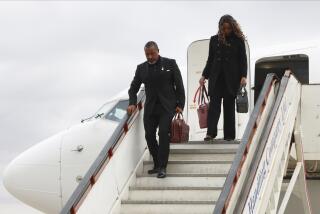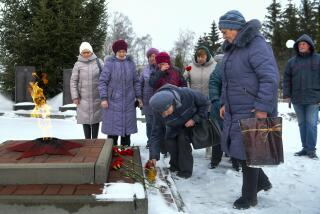Machel Plane Had Lost Way, Panel Told
- Share via
JOHANNESBURG, South Africa — The air crash that killed President Samora M. Machel of Mozambique and 34 others three months ago appears to have been caused by a misunderstanding between the plane’s Soviet crew and Mozambican flight controllers, a South African commission investigating the crash was told here Tuesday.
The Soviet crew, although experienced, had inexplicably lost its way while preparing to land at Maputo airport in Mozambique and had not been warned that it was off course before crashing into a wooded hillside just inside the South African border, according to the commission’s senior counsel.
Cedric Puckrin, the counsel, said that a joint investigation by South African, Soviet and Mozambican technical experts has ruled out sabotage--despite reports of a loud bang, there was no explosion or fire--and found the twin-jet TU-134A airliner to have been in good mechanical order and flying normally before the Oct. 19 crash.
He also said that, contrary to earlier South African government allegations, autopsies showed no evidence that the five-man Soviet flight crew, one of whom was among the nine survivors, had been drinking alcohol or using drugs.
The joint examination of the aircraft wreckage, recorded flight data and cockpit conversations indicated that the crew had not been misled by any “ghost beacon” that might have tricked them into mistaking the hillside for Maputo airport. The Soviet Union has said there was evidence that the airliner was lured off course by a false radio signal from South Africa.
The allegations, although unproved, gained considerable credence as a result of stern South African warnings shortly before the crash that Mozambique’s continued support of the African National Congress, the principal guerrilla group fighting minority white rule here, made it “co-responsible” for any ANC terrorist attacks.
Machel was returning from a meeting in Zambia with leaders of several other black-ruled neighbors of South Africa that have grown increasingly militant in calling for an end to apartheid here and in demanding the imposition of international economic sanctions against Pretoria.
The South African commission investigating the crash is headed by Cecil Margo, a respected Supreme Court justice and World War II fighter ace, and includes a retired British appeals court judge, a British aviation safety expert and Col. Frank Borman, the retired American astronaut, as well as two local aviation experts. Open hearings and full disclosure of all evidence have been promised.
Mozambique and the Soviet Union both declined to take part in the commission hearing. Moscow has argued that under an international airline treaty signed by all three countries, the official inquiry should be three-sided, just as the technical investigation was, and not held under the auspices of South Africa alone.
In Puckrin’s view, the cause of the crash was confusion in the cockpit, where the pilot had been regaling his crew with accounts of his flight experiences, and even more confusion at Maputo, where the flight controllers never realized the plane was off course.
Despite repeated requests by the Soviet crew for confirmation that the runway lights were on and other equipment was functioning normally at Maputo airport, where power cuts are frequent, the controller never gave a clear answer that they were, Renier van Zyl, the South African director of aviation safety, told the commission. As a result, Van Zyl said, the pilot was uncertain of his position even as instruments warned him that he was too close to the ground.
“There is no Maputo,” the pilot said as he came in to land, according to a translated transcript of what was said in the cockpit. The pilot complained that he could see no runway lights, adding: “Something is wrong, chaps. . . . It should be lit. . . . There’s a problem. . . . Nothing can be seen.”
According to the transcript, the navigator replied, seconds before the crash: “No, no, there’s nowhere to go. . . . There’s nothing.”
More to Read
Sign up for Essential California
The most important California stories and recommendations in your inbox every morning.
You may occasionally receive promotional content from the Los Angeles Times.













